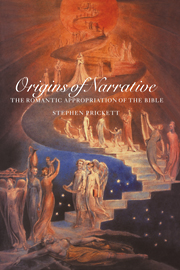Book contents
- Frontmatter
- Contents
- Preface
- Acknowledgements
- Introduction
- PART I JACOB'S BLESSING
- PART II THE ROMANTIC BIBLE
- 3 The Bible as novel
- 4 The Bible and history: appropriating the Revolution
- 5 The Bible as metatype: Jacob's ladder
- 6 Hermeneutic and narrative: the story of self-consciousness
- Epilogue
- Bibliography
- Index
6 - Hermeneutic and narrative: the story of self-consciousness
Published online by Cambridge University Press: 06 November 2009
- Frontmatter
- Contents
- Preface
- Acknowledgements
- Introduction
- PART I JACOB'S BLESSING
- PART II THE ROMANTIC BIBLE
- 3 The Bible as novel
- 4 The Bible and history: appropriating the Revolution
- 5 The Bible as metatype: Jacob's ladder
- 6 Hermeneutic and narrative: the story of self-consciousness
- Epilogue
- Bibliography
- Index
Summary
KINGSLEY AND NEWMAN: EROTICS OF INTUITION
As so often with scandalous books of the past, it is difficult for the modern reader to understand the degree of outrage that greeted the publication of Friedrich Schlegel's novel, Lucinde. Though its prose is wearisomely, indeed unrelievedly, purple, the suffusion of vague ecstatic adjectives makes the action so unspecific that it is difficult to make out what (if anything) is actually going on – indeed, what narrative can be discerned is so distanced and subjective that it would take considerable critical ingenuity to find anything conventionally erotic in it. Nor is this simply a matter of period: Moll Flanders and Fanny Hill, both written more than half a century earlier, can still hold an appreciable erotic power for the twentieth century – as their continued presence in paperback testifies. More immediately to the point, Goethe's Wilhelm Meister, published four years before Lucinde, in 1795, is much more explicit sexually, and was hailed by critics of the day, including Friedrich Schlegel himself, not merely as a masterpiece, but as a book of profound moral insight.
This may, of course, be due in part to the fact that Wilhelm Meister is an incomparably better novel than Lucinde, but to some extent the question of its ‘morality’ in the terms of German bourgeois culture of the 1790s can be separated from the more considered literary judgement of history.
- Type
- Chapter
- Information
- Origins of NarrativeThe Romantic Appropriation of the Bible, pp. 222 - 263Publisher: Cambridge University PressPrint publication year: 1996



